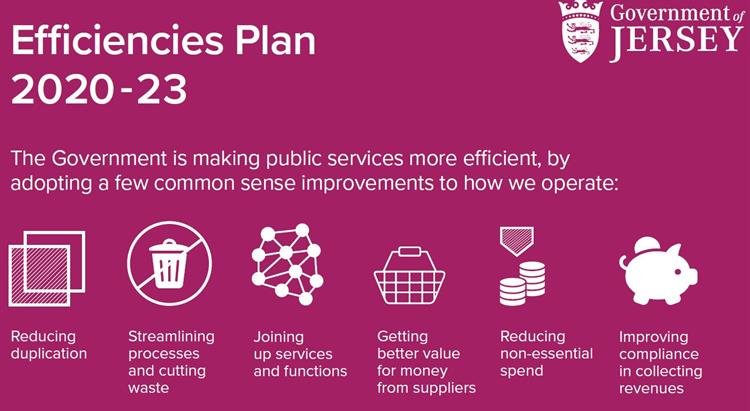21 October 2019

The Government of Jersey has today published its plan to make the public services more efficient, and to redirect the money saved into improving front-line services. The Efficiencies Plan explains how joining up services, being more commercial and cutting waste will help free up the investment to fund the Government Plan priorities over the next four years.
Chief Minister, Senator John Le Fondré, said: “This is a moment for which I have striven as a politician for more than a decade, when Jersey’s government can stand proud, with an ambitious and funded programme of initiatives to make Islanders’ lives better, backed by a modern, efficient and value-for money public service.”
Ministers have reviewed and challenged what government does and established a programme to deliver £100 million of efficiencies between 2020 and 2023, to be derived from four core areas:
- a modern and efficient workforce, through better investment in people and improvements in organisational development
- modern and efficient processes and systems, through investing in transformation through modern technology to reduce costs and duplication
- efficient commercial operations, through smarter commercial practices to get a better deal for Islanders
- efficient organisational structures, through ensuring that they are effectively designed and are value for money.
The savings will contribute to funding new spending commitments and ongoing initiatives. Redirecting savings into Government priorities reduces the additional revenue that the Government needs to seek from taxpayers.
The efficiencies programme will also help to transform services for the benefit of Islanders and put value for money at the heart of long-term decision making and planning.
Senator Le Fondré added: “Efficiencies are not about short-term cost-cutting and workforce targets, salami-slicing of departmental budgets, or cuts to frontline services. We are conducting a review of activities and costs to ensure that we use taxpayers’ money better, modernise government to deliver services at lower cost, and release funds to reinvest in the priorities that we have proposed in the Government Plan.
“We must do this, because if we don’t deliver £100 million of efficiencies, we will be wasting £100 million of potential funding for our priorities; money that could have been used to improve life for Islanders. This would mean either abandoning those priorities or seeking extra funding through increases in taxes and charges.
“Identifying more efficient ways of providing services will help to ensure that we can pay for what we do, without placing undue additional burdens on Islanders.”
The Government has identified the first £40 million of efficiencies for 2020, made up of £15 million from departmental initiatives, and £25 million from a range of cross-Government initiatives, including £12 million from more efficient commercial operations, £10 million through developing a modern and efficient workforce and more than £2 million through more efficient organisational structures.
The Council of Ministers confirmed £38.2 million of these efficiencies at its meeting on 16 October, but asked for some further detail on the remaining £1.8 million before these are also confirmed. Ministers also agreed that if any of the efficiencies are not subsequently approved, they will seek alternative efficiencies to the same value to replace them, or reprofile some of the planned growth and spending by the same amount, to ensure that income and spending remain in balance.
 Efficiencies Plan 2020-23
Efficiencies Plan 2020-23
Definition of an efficiency
An efficiency is defined as a level of performance that uses the least amount of input to achieve the highest amount of output.
Reflecting the broader strategic and operational objectives of the Government of Jersey, Programme efficiencies include:
- A reduction in cost, delivering better-quality services for less, through:
- reducing non-essential spend and developing lower-cost alternatives
- streamlining processes
- integrating services and functions and reducing duplicate activity
- More efficient collection of existing income, and better debt management
- Increasing the Government’s revenue through further recovery of existing costs, moving towards full cost recovery of services as required by the Public Finances Manual
- The extension and increase of existing charges, or introduction of new charges as revenue raising measures.
 gov.je
gov.je